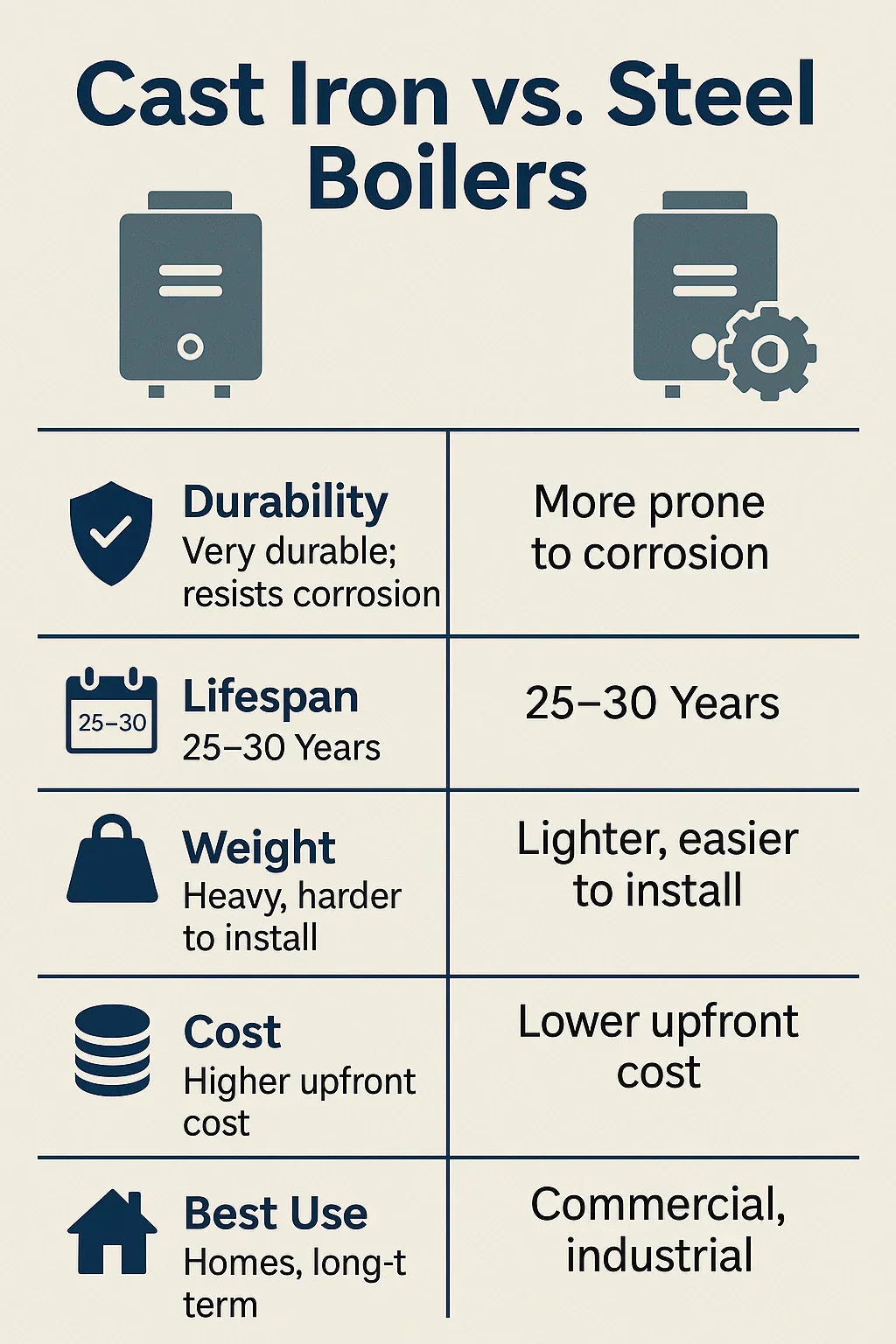When I started shopping for a new boiler, I thought the toughest part would be picking a brand. Instead, the first question my contractor asked stopped me in my tracks:
👉 “Do you want a cast iron or steel boiler?”
At first, I didn’t even realize there was a difference. Boilers are boilers, right? But once I dug in, I realized the material matters a lot for lifespan, performance, and even installation. After weighing the options, I ended up with a Weil-McLain CGA-6 cast iron boiler.
Here’s what I learned—and why I think many homeowners will end up making the same choice.
🔩 What Are Cast Iron Boilers?
Cast iron has been used in residential boilers for over a century. And for good reason: it’s durable, resilient, and proven.
Key features:
-
Durability: Cast iron sections resist corrosion better than thin steel plates.
-
Longevity: Typical lifespan is 25–30 years with proper maintenance.
-
Heat retention: Heavy metal holds heat longer, delivering steady warmth.
-
Quiet operation: The mass of cast iron dampens vibration and noise.
🛠️ What Are Steel Boilers?
Steel boilers are typically found in commercial and industrial settings, but some residential models exist. They’re lighter and easier to handle, but they don’t always hold up as long.
Key features:
-
Fabrication flexibility: Steel can be welded into large custom designs.
-
Weight advantage: Easier to install, especially in tight spaces.
-
Corrosion risks: Steel is more prone to pitting and rust without constant care.
-
Shorter lifespan: Usually 15–20 years in residential use.
🔗 HeatingHelp – Steel vs. Cast Iron Boilers
⚖️ Cast Iron vs. Steel: Side-by-Side Comparison
| Feature | Cast Iron Boilers | Steel Boilers |
|---|---|---|
| Lifespan | 25–30 years | 15–20 years |
| Durability | Highly resistant to corrosion | Prone to rust and pitting |
| Weight | Very heavy, harder to install | Lighter, easier handling |
| Heat Retention | Excellent—radiates heat evenly | Lower thermal mass |
| Noise | Quieter, dampens vibration | Louder under high load |
| Best Use | Homes, long-term installations | Commercial/industrial applications |
| Upfront Cost | Higher but longer payoff | Often cheaper upfront |
💡 Samantha’s takeaway: For homeowners, cast iron almost always wins the durability game.
🧮 Efficiency Considerations
One area where steel sometimes has the edge is in condensing boiler designs.
-
Cast iron boilers (like the Weil-McLain CGA-6) are typically 82–85% AFUE.
-
Steel condensing boilers can hit 90–95% AFUE, qualifying for federal tax credits and higher rebates.
But here’s the catch: condensing boilers work best in low-temperature return water systems. If your home uses standard high-temperature radiators, you won’t see the full efficiency benefit.
🔗 ENERGY STAR – Understanding AFUE
🧑🔧 Maintenance Differences
-
Cast Iron Boilers: Require regular flushing, vent checks, and annual inspections, but sections rarely fail if maintained.
-
Steel Boilers: Need more frequent water chemistry monitoring to avoid corrosion. Neglect can shorten life dramatically.
👉 My contractor summed it up perfectly: “Cast iron forgives; steel does not.”
💵 Cost Breakdown: Cast Iron vs. Steel
Cast Iron (Weil-McLain CGA-6 Example):
-
Equipment: $4,000–$4,800
-
Installation: $5,000–$6,000
-
Accessories: $1,500–$3,000
-
Lifespan: 25–30 years
Steel (Residential-Grade):
-
Equipment: $3,000–$4,000
-
Installation: $4,000–$5,000
-
Accessories: $1,500–$3,000
-
Lifespan: 15–20 years
👉 Over time, cast iron ends up being more cost-effective simply because you won’t be replacing it as often.
🏠 Samantha’s Real-World Decision
Here’s why I went with the Weil-McLain CGA-6 cast iron boiler:
-
Longevity mattered most. I plan to stay in my home for decades, and I didn’t want to replace the boiler again in 15 years.
-
Pennsylvania winters demand steady heat. Cast iron’s thermal mass keeps my house warm even during long cold snaps.
-
Quiet operation was a plus. With bedrooms above the mechanical room, noise mattered.
-
Utility rebate still applied. Even though I couldn’t get federal tax credits, my gas company gave me a $300 rebate for upgrading to a new unit.
💡 My advice: Don’t just think about efficiency ratings—think about the kind of comfort and durability you want for your home.
❓ When Steel Might Be the Better Choice
To be fair, steel boilers aren’t always the “wrong” choice. They make sense if:
-
You’re installing in a large commercial property.
-
You want a lighter unit for a tricky basement or rooftop install.
-
You’re looking for ultra-high efficiency condensing designs and can maintain them diligently.
✅ Key Takeaways
-
Cast iron boilers = durability, longevity, and steady comfort.
-
Steel boilers = lighter, cheaper upfront, but shorter lifespan and higher maintenance.
-
For most homeowners, cast iron is the smarter investment.
-
Samantha’s advice: Think beyond first costs. Cast iron wins the long game for residential comfort.
In the next topic we will know more about: Troubleshooting Guide: What to Do If Your Weil-McLain CGA-6 Isn’t Heating Properly







